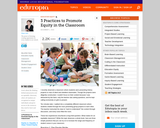
Learn about the thinking behind three equitable practices in classroom where all students are recognized as unique individuals, have equity in voice, and given access to the resources they need to learn.

Learn about the thinking behind three equitable practices in classroom where all students are recognized as unique individuals, have equity in voice, and given access to the resources they need to learn.

All students enrolled in grades 6 through 12 in a school district will participate in ACP. This includes students with disabilities who have IEPs and Section 504 accommodation plans. Use this Community of Practice webinar to make sure that ALL of your students have equal access to Academic and Career Planning opportunities.
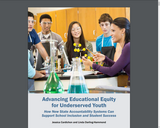
This brief produced by the Learning Policy Institute summarizes research and recommendations for strategies states and districts can do to improve equitable opportunities and outcomes. The brief suggests that to promote equity and improve outcomes, states can:
• track suspension and expulsion rates, while removing zero-tolerance discipline policies
that have proven ineffective in improving youth performance, replacing them with
restorative justice practices;2
• incentivize schools to evaluate and improve school climate, which is associated with youth
achievement and educational attainment, for all groups of youth, with special attention to
those who are most vulnerable;
• monitor attendance and chronic absenteeism, and create approaches to intervene early
and support attendance where needed to increase learning time;
• use an extended-year graduation rate (e.g., 5, 6, or 7 years), as well as a 4-year rate, to
encourage high schools to work with and bring back young people who, for a variety of
reasons, could not graduate in 4 years; and
• measure youths’ access to and completion of college- and career-ready courses of study
in an effort to open up evidence-based pathways to future success that help youth reach
their potential and encourage schools to offer these opportunities to all youth.

Amazon Future Engineer features live and prerecorded career chats featuring Amazon professionals. Scroll down the page to access videos on the following careers:
- Product Sustainability Manager
- Studio Director
- Software Development Engineer
- AWS Startups Account Manager
- Sr. Technical Product Manager, DIsaster Relief
- Engineer Intern
- Sustainability 101
- Tech in the Music Industry
- Transportation 101
- Software Engineers
- User Experience (UX) Designers
- Future Engineers
- Transportation for Good
- Remarkably Black in Tech
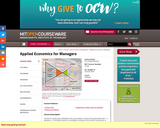
Develops facility with concepts, language, and analytical tools of economics. Covers microeconomics, macroeconomics, and international trade and payments. Emphasizes integration of theory, data, and judgment in the analysis of corporate decisions and public policy, and in the assessment of changing US and international business environments. Restricted to Sloan Fellows. The fact of scarcity forces individuals, firms, and societies to choose among alternative uses -- or allocations -- of its limited resources. Accordingly, the first part of this summer course seeks to understand how economists model the choice process of individual consumers and firms, and how markets work to coordinate these choices. It also examines how well markets perform this function using the economist's criterion of market efficiency. Overall, this course focuses on microeconomics, with some topics from macroeconomics and international trade. It emphasizes the integration of theory, data, and judgment in the analysis of corporate decisions and public policy, and in the assessment of changing U.S. and international business environments.

Students will discover contributions of Black inventors and pioneers in the field of energy efficiency and the assets they possessed that helped them overcome challenges. ABOUT THIS WEBQUEST: Built around the themes of Black Leaders in Energy, Representation, & Climate Change 5E lesson format: Engage, Explore, Explain, Elaborate, EvaluateEach “E” can be used as an independent lesson or all five can be completed as a unit (Each “E” takes 1-2 class periods to complete)Requires collaboration/discussion with peers and as a whole classCan be embedded in Energy or Climate curriculum or used as stand-alone lesson/sCan be modified to meet the needs of your students Recommended for grades 7-12This lesson requires use of the internet.Use this slideshow with the Black Leaders in Energy Webquest Activity Sheet.If students are utilizing a digital copy of the activity sheet, all links provided are active.If students are utilizing a paper copy of the activity sheet, please share a copy of the slideshow with them so they have easy access to links needed for the webquest.Remix this resource to have a version you can edit to meet your needs.This resource was developed by KEEP—Wisconsin's K-12 Energy Education Program.
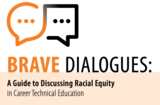
The purpose of Brave Dialogues: A Guide to Discussing Racial Equity in Career Technical Education is to provide state Career Technical Education (CTE) leaders with tools to engage in discussion around racial equity in CTE and to support state CTE leaders in creating an environment in which all stakeholders have the language and comfort to discuss challenges and opportunities related to racial equity in CTE.
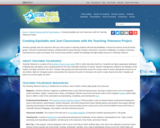
This article provides an overview of Teaching Tolerance, a project of the Southern Poverty Law Center that provides educators with free resources around the areas of equity, justice, and tolerance.
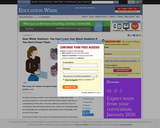
Dr. Bettina Love, professor at University of Georgia, writes about how it isn't enough to "love all students." This article is in Ed Week, published on March 18, 2019.
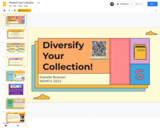
Slide deck from WEMTA 2022 presentation on how to create a diverse collection, including lots of links to additional resources and an example audit.
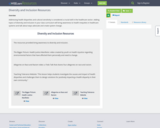
Addressing health disparities and cultural sensitivity is considered a crucial skill in the healthcare sector. Adding topics of diversity and inclusion in your class curriculum will bring awareness to health inequities in healthcare systems and talk about ways advocate and create system change.

Dr. Bettina Love keynotes at the 2018 YWCA Racial Justice Summit in Madison, Wisconsin.
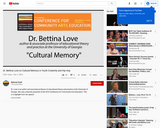
Dr. Love is an author and associate professor of educational theory and practice at the University of Georgia. She was a keynote presenter at the 2016 Conference for Community Arts Education, November 2-5, 2016. This is a highlight from her speech.

Dr. Bettina Love, an esteemed writer and educational researcher, will be speaking at Madison College’s Truax campus. Dr. Love will be appearing at a free event inside of Mitby Theater on Wednesday, May 8 at 6:30 p.m.
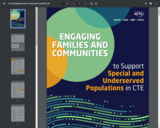
Career and technical education (CTE) programs are increasingly engaging a broad range of stakeholders, including parents and community organizations, to improve CTE programs, better serve students and help communities in need. This resource will focus on ways that CTE educators can communicate with, collaborate with and support current and prospective learners’ families and communities, particularly for learners and communities who have been historically underserved. This publication describes general strategies for engaging these stakeholders, more specific strategies aimed at breaking down barriers to engagement for particular special and underserved population groups, and examples of CTE and career development programs doing promising work in this area.
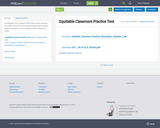
An adaptable tool to captures observable teacher behaviors that reflect culturally responsive teaching through examples and non-examples. Can be modified to fit the need of the school.
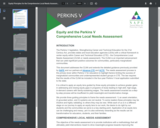
This document addresses the CLNA and extends the detailed guidance previously provided by NAPE and our partners at Advance CTE and ACTE. The needs assessment process is the primary lever within Perkins V for educators to highlight factors limiting the success of marginalized communities and underrepresented student groups in CTE. The law requires that the results of the CLNA be included in the four-year Perkins V local application submitted to the state.

What do you think of when you hear the phrase "access and equity?" Use this Community of Practice presentation to learn more about equity and how it impacts ACP in your district.
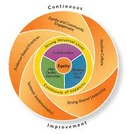
Addressing equity in the Academic and Career Planning (ACP) process goes beyond offering a
scope and sequence of ACP activities that are available to all students. It’s important that you
meet the needs of each learner. Every child will approach the ACP process differently and will
require an individualized level of support to be successful.
Therefore, it’s essential that school leaders responsible for implementing ACP explore equity
issues. The following are short activities that can help ACP or career readiness teams and leaders
encourage their own stakeholders to learn more about what equity means, how to explore who
they are, what beliefs and assumptions they hold, identify their values, and consider how all of this
can impact the learners and families they serve. The goal of each activity is to help educators learn
a little more about their students and themselves and to leave with one simple action step to
improve equity within their district.
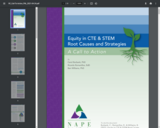
This resource builds on the success and impact of the Nontraditional Career Preparation Root Causes & Strategies, which focused on identifying evidence- and research-based practices to address equity gaps in nontraditional occupational pathways, especially for women in CTE programs of study leading to STEM jobs. The original “Root Causes” Resource is the backbone for NAPE’s Program Improvement Process for Equity™ (PIPE™). The new Equity in CTE & STEM Root Causes and Strategies is an in-depth analysis of the root causes of inequity and exclusion in CTE and STEM education through an intersectional lens.